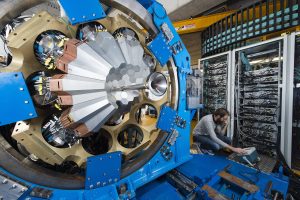Conveners of the WP: Jerome Buadot (IPHC) and Marie-Laure Gallin-Martel (LPSC)
Solid-state or semiconductor detectors are widely used in the experiments supported by IN2P3 in high energy physics, nuclear physics, astroparticle physics and medical applications.
The semiconductor expertise in our laboratories covers a wide range of materials and the activities carried out can include conception, simulation, fabrication, characterization and integration.
Silicon detectors (e.g., CMOS, MAPS, DeMAPS, LGADs…) are mainly used in photodetection and particle tracking, which requires high granularity, ultra-fast timing, reduced material budget and roughness to work in extreme radiation conditions. Cryogenic-operated germanium systems are largely used in high resolution gamma and X-ray spectroscopy; still some R&D is done on HPGe detector fabrication to improve its performance and to implement new complex geometries. Given their low noise and low energy threshold, semiconductors have recently found application in rare events physics (dark matter, neutrino coherent scattering…), facing the challenge of building massive detectors (> 10 kg). Wide bandgap semiconductors are suitable for high radiation environments: diamond detectors are a faster and radiation-harder alternative to silicon for medical applications and SiC in high temperature conditions (e.g., nuclear environments). Compound semiconductors like CdTe, HgTeCd or InGaAs are indicated for Infrared Red (IR), X-ray and gamma-ray detection, and are often employed in spatial applications, whereas GaN and InP have scintillation properties and are used in photodetection and optoelectronics.
The specific performance and technological developments depend on the physics drivers and the specific application field. However, some R&D axes such as improving energy, space and time resolution, and developing a high-speed, high-rate and efficient data readout, could be considered of general interest.
The working group collaborates closely with the network of technical expertise in semi-conductor detectors.
Events:
ECFA-DRD3 workshop, 17-21 June 2024, CERN
Journées réseau semi-conducteur, La photo-détection avec les semi-conducteurs, 3-4 June 2024, Grenoble
French-Japan workshop on semi-conductor material, June 2024, Grenoble
Atelier pixel det. en France, 19-20/09/2023, Marseille

